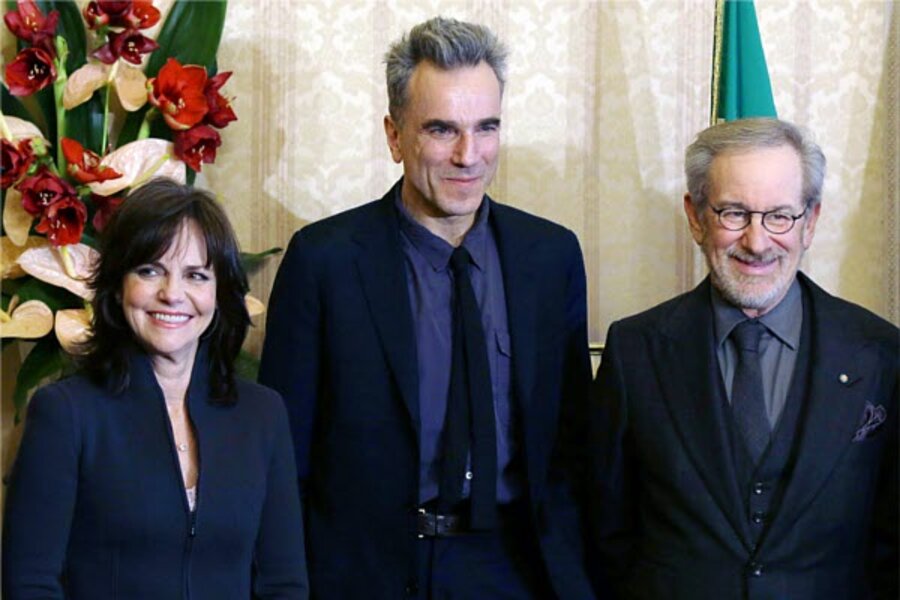Oscars 2013: Is Hollywood ready for gender-neutral awards?
Loading...
| LOS ANGELES
Do Meryl Streep, Anne Hathaway and Helen Mirren really need a category just for women — a singular kind of affirmative action — to snare one of Hollywood's favorite accessories, an Oscar, Emmy or Screen Actors Guild trophy?
In a society tilting steadily toward gender neutrality, the separate-but-equal awards that divide actors into one camp and actresses into another have the whiff of a moldy anachronism.
True, the Association for Women in Science gives honors to encourage female success in male-dominated fields. But to mark enduring achievements, would its members ever yearn for a Women's Nobel Prize in physics?
In contests of intellect or artistry, should gender ever matter?
"It's not like it's upper body strength," Gloria Steinem dryly observed of the requirements of acting.
The separate labeling of male and female performers is losing favor in the industry. Actresses often swat the distinction away by calling themselves "actors," standing shoulder to shoulder with their male counterparts.
Usherettes are long gone from movie theater lobbies, after all. And defense officials said Wednesday the Pentagon will be lifting its ban on women in combat.
SAG, which holds its awards ceremony Sunday, edged toward neutrality with its trophy dubbed the Actor, although the guild gives separate honors to best performance by a male actor and by a female actor.
That cracks the door open, but only slightly. Fling it wide so that Daniel Day-Lewis' majestic performance in "Lincoln" and Jessica Chastain's steely turn in "Zero Dark Thirty" vie for the grand prize!
"That's a great idea," said Mark Andrews, writer-director of the animated film "Brave." ''At the end of the day, we're all storytellers, and I don't think when we're defining a character that the gender is the major defining factor."
In all other awards-eligible fields, including directing, writing or cinematography, everyone is "going for it," male and female alike, Andrews said.
That may be progress in theory for performers but not in practice, according to Sally Field, a SAG and Oscar best supporting actress nominee for "Lincoln."
"If you do that you won't see any actresses up there (on stage) at all," she said. "The percentage of roles is so weighted toward actors. That's the way it's always been."
Exactly, concurred Naomi Watts, "The Impossible" best actress SAG and Academy Award nominee.
"There's so much competition in life and I do think we are different," she said. "Yes, we should be able to have the same things as much as possible ... (but) life's a battle already and there's so many great roles written for men. Women are definitely at a disadvantage when it comes to volume."
Rapper Nicki Minaj, who's considering launching an acting career, has a pragmatic take on the issue.
"You see all those divas in the audience looking so pretty, and they all want to beat each other out," she said. "It's entertainment."
Hathaway, in the running for SAG and Oscar supporting actress honors for "Les Miserables," considers the gender split "an awesome question worthy of an awesome debate."
"Can I conceive of a world where performance becomes a genderless concept? Absolutely. Do I think it's going to happen anytime soon? No," she said.
As Field pointed out, the bedrock challenge is that women get fewer substantive roles than men. Ironically, that's obscured by the artificial parity on stage each year at awards shows. Five women compete, five men compete, two winners are crowned.
So what's the problem? A quick numbers check makes it clear: Females comprised about a third of the characters in the 100 top-grossing films in 2011, according to the Center for the Study of Women in Television and Film at San Diego State University.
This, despite the fact women make up slightly more than half of the U.S. population. And the finding isn't an anomaly, according to the center's past research.
In this context, feminist leader Steinem sees legitimate reason to retain separate acting awards. When two unequal groups are combined it's the less-powerful one that loses, she said, as when 20th-century U.S. school desegregation lead to mass layoffs of black principals and administrators.
Hollywood, often viewed as staunchly progressive, shows no indication of abandoning tradition in the awards arena.
The Oscars Awards, a reflection of their time, launched in the 1920s with his-and-hers acting trophies (for Emil Jannings and Janet Gaynor) and stuck with the formula.
Television showed its modernity by kicking off the Emmy Awards in 1949 with a gender-neutral trophy for best TV personality — which was won by a woman, Shirley Dinsdale, according to Emmy archives.
Following Oscar's lead, however, the Emmys quickly added separate actor-actress contests in 1951. A best reality host category, begun in 2008, is open to men and women.
Tom O'Neil, editor of the Gold Derby awards prediction site, said strong forces are arrayed against change.
Awards shows routinely try to add celebrity-driven categories, not drop them, to increase a show's "glamor and glitz" quotient, he said, as well as mask the industry's unequal treatment of women.
"It's criminal," he said, bluntly.
In the behind-the-scenes film and TV categories in which the sexes compete, women rarely make it on stage at awards ceremonies. The Oscars started in 1929, but it wasn't until 2010 that the first woman, Kathryn Bigelow, was honored as best director (for "The Hurt Locker"). Statistics again provide clarity: Women made up a paltry 9 percent of the directors on 2012's top-grossing films, a new San Diego State University study found.
Let's give two-time Oscar winner Field the last word in this debate.
Actresses "should be in their own category because they ARE in their own category," she said. "They face their own specific kind of difficulties surviving in this business that actors, bless their hearts, don't face."
Lynn Elber is a national television columnist for The Associated Press. She can be reached at lelber(at)ap.org. AP Entertainment Writers Sandy Cohen and Anthony McCartney contributed to this report.







